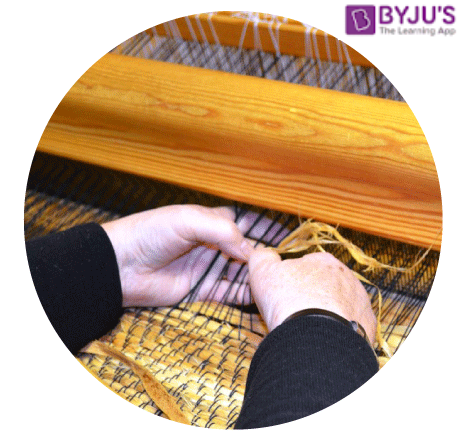We encounter many different types of fabric on a daily basis. Fabrics can be broadly classified as synthetic fabrics and natural fabrics based on the type of fibres they are derived from. Common examples of natural fabrics include cotton, denim, wool, and silk. The fibres that constitute these fabrics can always be sourced from natural origins. For example, cotton is obtained from the cotton plant, silk is obtained from the cocoon of the silkworm, and wool is obtained from sheep and other animals. Synthetic fabrics are fabrics that are made up of artificial or man-made fibres. Common examples of synthetic fibres include rayon, nylon, velvet, and felt.

Table of Contents
Types of Natural Fabrics
Natural fabrics are fabrics that are produced from naturally sourced raw materials. Some common types of natural fabrics are listed in this subsection.
Cotton
Cotton fibres develop along with the seeds of the cotton plant. These fibres are plucked and spun into yarn. This yarn is then woven into cotton fabric. Cotton is widely used in clothing apparel due to its light and breathable texture. Furthermore, cotton is one of the most preferred fabrics in hot and humid regions (such as coastal areas). This is because cotton is highly breathable and can also absorb a good amount of sweat.
Silk
Silk fabrics are woven from silk yarn, which can usually be sourced from the cocoons of the silkworm. The most common form of silk is obtained from the silkworm species known as Bombyx mori. The practice of rearing silkworms to extract silk from them is popularly known as sericulture. The absorbancy of silk fabrics makes them highly desirable in warm climates. Furthermore, silk is a very soft fabric that can also offer protection against some insects such as mosquitoes. Silk is also used in some types of parachutes. Common examples of fabrics that are made from silk fibres include chiffon, charmeuse, crepe de chine, and shantung.
Wool
Wool fabrics are made up of wool fibres, which are obtained from certain woolly animals such as sheep. Common examples of wool fabrics include cashmere, angora, mohair, and qiviut. Wool is one of the most preferred types of fabric in cold areas due to its ability to trap heat and keep its wearers warm. It is also used in blankets, carpeting, saddle cloth, and horse rugs.
Types of Synthetic Fabrics
Synthetic fabrics are fabrics that are produced from artificial or man-made raw materials. Some important types of synthetic fabrics are listed in this subsection.
Rayon
Rayon is a synthetic fabric that is made from fibres that are made from naturally sourced cellulose. Rayon is not considered to be a fully synthetic fabric because it is manufactured from natural raw materials. These fabrics are known to be highly versatile and can are even known to mimic the texture and feel of natural fabrics such as silk, linen, cotton, and wool. The fabrics made up of rayon fibres are known to be very soft, comfortable, and quite absorbent.
Nylon
Nylon fabric is a polymer fabric that is made up of synthetic fibres. It usually features low breathability but very high tensile strength and resistance to wearing and tearing. Nylon fabrics are usually quite stretchable and are, therefore, widely used in socks and stockings. These fabrics are also used in sportswear. Unlike rayon, nylon fabrics are 100% synthetic.
To learn more about the different types of fabric along with other concepts related to clothing fabric, register with BYJU’S and download the mobile application on your smartphone.

Comments